
Let’s look at a scenario that I think we will all find familiar (I, for one, am guilty of this choice). A student, let’s call him Mike, comes to class agitated. Maybe he got into a fight with his girlfriend, something is blowing up in his home life, or maybe he is returning to class from the office after having been kicked out of a previous class. It could be a myriad of reasons, it really doesn’t matter why. What’s important is that it is obvious he is upset and the cause is not this class or this teacher because he enters the classroom in this state.
He goes to his desk and puts his head down and closes his eyes. Maybe this student has a history of being a disruption in class or maybe the teacher is agitated too from last hour’s class, personal stress, or is just tired of dealing with this particular student day after day. The teacher decides today to draw a line, “Mike, sit up and pay attention, please” in that firm teacher voice.
Mike doesn’t move.
The teacher walks over so that he is standing over Mike. “Please sit up, open your book, and follow along.”
Mike still doesn’t budge.
Getting more stern, “Mike, sit up or I am writing you up.”
Mike jerks up in his seat and angrily says, “Why don’t you just leave me alone!”
Teacher in a calm, but passive aggressive voice says, “Mike, I need you to drop the attitude and pay attention.”
Mike yells, “@%&^ you, why are you always on my case?”
Teacher in a calm, “winning” voice, “Go to the office right now.”
The teacher had a choice to be a caring adult and handle this differently. He could have used his own SEL skills to check in with Mike, offer him some space to decompress, or the opportunity to talk to a counselor. Instead the teacher power-tripped, and intentionally escalated Mike to a point where the student’s behavior could be blamed for the consequence that made the teacher’s day easier: removal from class. The teacher has all of the authority in this situation and unless there is a physical alteration, the teacher is always going to win and be backed by administration.
Hopefully, you can see an analogy to the police and African Americans in the United States. The police have all of the authority and can escalate or accuse at any time to make arrests. The video evidence and statistics prove that this country has a problem with how police treat African Americans, and the judicial system rarely holds the police accountable. This is unacceptable and needs to be changed. But I am not am expert on how that should happen. (See https://8cantwait.org for ideas on changes to be made).
Sometimes it is easier to get upset by the racism of someone else, like the police, than to examine ourselves. I want to challenge white teachers to look at their classroom management practices. We know that everyone in this country has implicit racial biases (including people of color) that have been conditioned into us from a young age.
Remember racism is an action that we need to fix, not a judgement of our personal morality.
Robin Diangelo in White Fragility explains the false good/bad binary about racism: Bad people are racist, and good people are not. By this logic to admit (or be informed of) racist actions is to be a bad person, usually resulting in defensiveness. Instead think of racism as a continuum that everyone is on because of historical institutional racism. Diangelo states, “I am not in a fixed position on the continuum; my position is dictated by what I am actually doing at a given time…Am I actively seeking to interrupt racism in this context?” So all of us need to constantly analyze our actions, admit mistakes, and readjust.
When you think about your teaching, are the “Mikes” in your classroom primarily students of color? The data shows that black students are suspended at much higher rates than white students. Many studies have shown that black and hispanic students receive harsher consequences for the same actions as white students.
I don’t believe that most teachers are explicitly targeting black students for referrals, detentions, or suspensions.
The problem is that this happens implicitly without teachers even thinking about it. My challenge for white teachers is to reflect on your interactions with students, especially those that are most challenging for you. Honestly try to analyze if you are being fair and impartial. Talk it over situations with a trusted colleague who will give you honest feedback. If you have failed, learn from it. If you have a current student who pushes your buttons, try opening a dialogue with them.
I recommend that white educators learn more about racism. Read some books, listen to podcasts, and do the work to see the perspective of people of color. There are lots of resources for your classroom, but the real work starts inside ourselves on how we can be a part of dismantling racism in schools.
Questions? Interested in SEL and PBL Consulting? Connect with me at michaelkaechele.com or @mikekaechele onTwitter.

